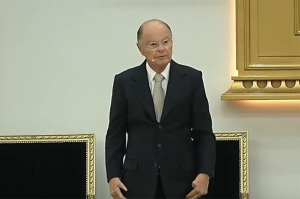Six in 10 Americans Believe in Evolution, Says Pew Survey
A recently released report from Pew Research has found that six in 10 Americans believe that evolution is how the species came to be.
Pew's Religion & Public Life Project released results Monday that showed 60 percent of respondents stating belief that humans have evolved with time, versus 33 percent who believe that humans have existed in their present form since the beginning.
"The share of the general public that says that humans have evolved over time is about the same as it was in 2009, when Pew Research last asked the question," reported Pew.
"But many Americans believe that God or a supreme being played a role in the process of evolution. Indeed, roughly a quarter of adults (24 percent) say that 'a supreme being guided the evolution of living things for the purpose of creating humans and other life in the form it exists today.'"
Ken Ham, president of the creationist group, Answers in Genesis, told The Christian Post that he felt the Pew findings were "definitely an indication of where people stand in regard to the issue of creation-evolution."
"America has had a lot of conservative Christian background and there's still a very big remnant of conservative Christianity in this nation," said Ham.
The Pew survey also found that 64 percent of white evangelical Protestants believed that humans have existed in their present form since the beginning, with 50 percent of black protestants and only 15 percent of white mainline Protestants agreeing.
Pew's Findings were based on telephone interviews conducted March 21 through April 8, with a sample space of 1,983 adults aged 18 and older.
Ham told CP that he believes the resources provided by Answers in Genesis, while not completely responsible for the percentage of creationists in the United States, "do contribute" to the number.
"There's still of a lot of people in this nation that will take a strong stand on believing in a literal Genesis, believing in creation and not believing in evolution," said Ham.
"I think if you didn't have the creation apologetics organization like AIG [and others] I don't think it would be as strong."
The Pew survey comes out as debates over the place of evolution and intelligent design continue to manifest in public education.
In December, the Texas State Board of Education approved a biology textbook in spite of intense opposition based in large part on what were believed to be factual errors in the text regarding the theory of evolution.
Known as the Pearson biology textbook, the academic text was subjected to a review wherein a panel concluded that no errors exist in the material.
The National Center for Science Education, a critic of efforts to insert anti-evolution and creationist views into public science classes, lauded the review panel's decision.
"With this decision, Texas teachers and students can finally be confident that any Texas edition science textbook reflects good science and a thorough presentation of evolution," said Joshua Rosenau of NCSE in a statement.
When asked by CP as to what was needed to reverse the trend found by Pew regarding belief in evolution, Ham responded that there were two major issues that needed to be tackled.
Ham told CP that he felt "there's a censorship" that needs to be overcome in public schools, "secular journals," and television wherein the creation science viewpoint is disallowed.
He also commented that to combat the censorship of creation science, the Creation Museum will begin offering free admission to children younger than 12, starting next year.
"In 2014, we for the Creation Museum have said that all kids 12 and under are free," said Ham. "We're trying to undo the censorship and get more kids, more of the younger generation."
"We see a change in the coming generation because more of the younger generation that are coming through a secularized education system. We need to reach more of the kids."
Ham also told CP that another way to reverse the trend noted by Pew is to "reach more of the church to get the church to turn around."
"So many Christian leaders, so many church leaders, so many pastors, so many Christian academics have actually adopted evolutionary ideas," said Ham, adding that, "we need a concerted effort" to combat "the compromises."





























